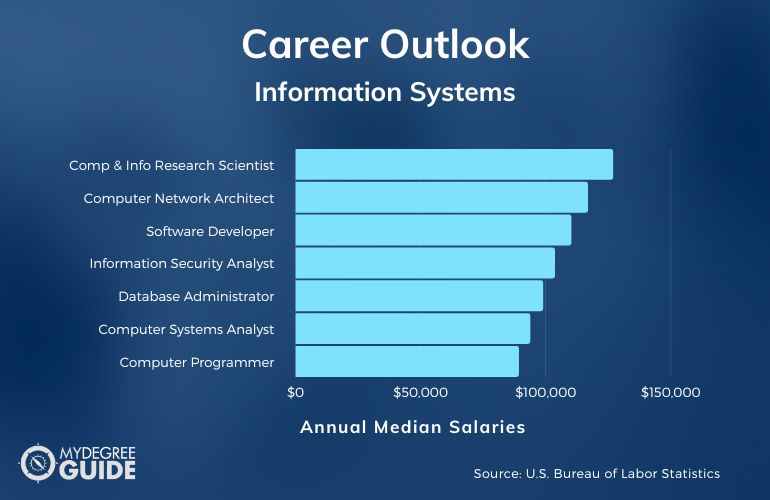Earning a masters in information systems online can help you learn the best practices for keeping track of a business’s information in their computer systems. You’ll also learn how to best keep that information secure.

The field of information systems sits in the overlap between computer science, information technology, and business.
Editorial Listing ShortCode:
There are many career opportunities in this growing field. In the digital age, there are a wide variety of businesses that need experts on information systems.
Universities Offering Online Master’s in Information System Degree Programs
Methodology: The following school list is in alphabetical order. To be included, a college or university must be regionally accredited and offer degree programs online or in a hybrid format.
Arizona State University
Arizona State University offers a Master of Science in Information Systems Management degree that can be earned by taking ten 5 week long courses for a total of 30 credits. Students can choose one of three specializations in tech consulting, data analytics, or cloud computing to further streamline their education.
Arizona State University is accredited by The Higher Learning Commission.
Auburn University
Students in Auburn University’s Master of Science in Information Systems program will meet early and often with personal faculty advisors in order to create and adhere to online plans of study that are best for them. Courses include an MMIS project, advanced database management, and information systems analysis and design.
Auburn University is accredited by the Southern Association of Colleges and Schools Commission on Colleges.
Bellevue University
The 36 credit management information systems masters program at Bellevue University allows students to choose from five concentrations.
They can select information security management, cybersecurity, business analytics, business administration, or the GAC accredited information technology project management option. There are courses on IT infrastructure, managing IS organizations, IT strategy and policy, and information security.
Bellevue University is accredited by the Higher Learning Commission.
Drexel University
Drexel University’s Master of Science in Information Systems program can help professionals in the information technology and systems fields improve their current skills and techniques and learn about the newest, most innovative technologies used today.
Graduates should be prepared for senior- and management-level careers in a variety of It-related fields.
Drexel University is accredited by the Middle States Commission on Higher Education.
Embry-Riddle Aeronautical University
Students enrolled in Embry-Riddle Aeronautical University’s management information systems masters program can choose between business intelligence and analytics or information technology management for their specializations.
Students choosing the business intelligence concentration can also earn joint SAS certifications. The coursework provides a balanced mixture of systems engineering courses and business and management courses.
Embry-Riddle Aeronautical University is accredited by the Southern Association of Colleges and Schools Commission on Colleges.
Florida State University
The Master of Science in Management Information Systems program from Florida State University is a 33 credit program that combines coursework from various technology-related fields and the school’s management and business programs.
The program has accreditation from the AACSB and requires seven core courses and four student-selected electives to complete.
Florida State University is accredited by the Southern Association of Colleges and Schools Commission on Colleges.
Liberty University
Liberty University’s Master of Science in Information Systems program is a 100% online, 36 credit program. Courses run for 8 weeks. There are no GRE requirements for admission, and the application fee can be waived in certain circumstances. Students can transfer up to 18 credits into the program.
Liberty University is accredited by the Southern Association of Colleges and Schools Commission on Colleges.
Northwestern University
Northwestern University features a Master of Science in Information Systems program with eight different areas of concentration, including options in information systems, information systems management, and information systems security.
Students will learn about innovation with blockchain technology, object-oriented programming, telecommunication networks, web and software application development, and disaster recovery and continuity.
Northwestern University is accredited by the Higher Learning Commission.
Tarleton State University
Tarleton State University’s Master of Science in Information Systems program is a 100% online, 36 credit program that some students are able to complete in about 1 year. Most courses in the curriculum focus on management information systems, networking, project management, business intelligence, databases, and systems analysis and design.
Tarleton State University is accredited by the Southern Association of Colleges and Schools Commission on Colleges.
West Texas A&M University
Students applying to West Texas A&M University’s Master of Science in Computer Information Systems and Business Analytics program can have their GMAT requirements waived if they meet certain requirements.
Students also have a lot of control over their personalized plans of study. Classes are chosen from six major computer science-related areas.
West Texas A&M University is accredited by the Southern Association of Colleges and Schools Commission on Colleges.
Masters in Information Systems Online
There are a number of different online master’s in information systems degrees available. Here are two common types of graduate degrees available in this field.
Select the program that most interests you to jump to that section of the guide:
The program that’s best for you will depend on your personal interests and professional goals.
Management Information Systems

This information systems graduate program is focused on using information systems for decision-making purposes in a business.
Information systems can be used to identify ways a business can increase efficiency and productivity and can better meet its customers’ needs. Studying information systems for this purpose can be very complex. Businesses can analyze vast quantities of data from consumers and apply this information to real-world scenarios.
Editorial Listing ShortCode:
For example, an online retailer might need to track trends in customer purchases, or an entertainment streaming service might use data to provide recommendations to its users.
An information management system can help the management of a business to form strategies to increase revenue. If you pursue a masters in management information systems, you will study these types of processes and how they affect a business and its customers.
Information Systems Security

An information systems security degree is concerned with protecting data from hackers and other threats. In the digital age, a business’s information system may store sensitive information from customers, such as credit card information, mailing addresses, and purchase histories.
Keeping this sensitive information private is vitally important. A security breach could cause customers to fall victim to identity theft. Security breaches could ultimately hurt a business since customers may not return if they worry that their privacy is compromised.
Editorial Listing ShortCode:
Because cyber security is so important at the present time, many companies hire people who specialize in ensuring that the company’s information system is tightly protected against hackers and data thieves. When pursuing a degree in information systems, you could specifically choose to get a masters in information security online.
Information Systems Careers & Salaries

According to the Bureau of Labor Statistics, there are many different careers in which a masters in information systems is useful. Many of the following careers can be obtained with a bachelor-level education, so having a masters may set you up for a higher starting salary.
| Careers | Annual Median Salary |
| Computer and Information Research Scientist | $126,830 |
| Computer Network Architect | $116,780 |
| Software Developer | $110,140 |
| Information Security Analyst | $103,590 |
| Database Administrator | $98,860 |
| Computer Systems Analyst | $93,730 |
| Computer Programmer | $89,190 |
| Network and Computer Systems Administrator | $84,810 |
| Web Developer | $77,200 |
| Computer Support Specialist | $55,510 |
People who work in technology follow many different education and career paths. Some of these occupations don’t necessarily require an information systems masters, but having a graduate degree could increase the likelihood of employment.
Information Systems Master’s Curriculum

Here are some examples of courses that might be required as part of a masters in information systems:
- Sociology: Sociology is an important subject in the study of information systems because it will help you to develop big picture critical thinking skills and to understand the effects of technology on society and human relationships.
- Database Design and Development: This course is about how to create cost-effective and efficient databases for use in business.
- Fundamentals of Database Management Systems: This course teaches about why we need database management systems and about topics such as database architecture and data mining and retrieval.
- Human and Computer Interaction: This course will teach you about user experience and how to ensure that technology applications provide a good user experience.
- Hardware Engineering: This course covers how to engineer the computer hardware that must first exist for an electronic information system to work.
- Software Engineering: Understanding a complete information system involves understanding each component of the system, including the software. This course covers how to engineer the programs and operating systems that make computer hardware usable.
- Statistical Graphics and Visualizations: Information systems are often used to keep and generate statistics. This course will help you improve your ability to analyze complex graphs and charts.
- Negotiation and Conflict Resolution: This course will help prepare you for the business and interpersonal aspects of the information systems field.
- Managing Across Cultures: This course covers how businesses are managed differently in different cultures to help prepare you for working with many different people from different social backgrounds.
- Introduction to Entrepreneurship: This course will teach you about what it’s like to run your own business, should you choose that path upon graduation.
Exact course requirements vary depending on the institution and program.
Admissions Requirements

Typical admissions requirements for an online M.S. in Information Systems include the following:
- Undergraduate degree. It’s preferable for your bachelors degree to be in a related field. If your bachelors is in an unrelated field, you may need to demonstrate that you have the computer programming knowledge necessary to keep up with the coursework.
- Letters of recommendation. One or multiple letters of recommendation from a teacher or mentor may be required.
- Test scores. GRE or GMAT scores may be required, but a growing number of schools are no long requiring these.
Exact admissions requirements will vary across institutions.
Accreditation

Regional accreditation is a process that ensures academic institutions are providing quality education. To become accredited, a college or university must be reviewed by an outside organization, and it must then undergo regular reviews to maintain its accreditation status.
If a school has regional accreditation, you know it meets certain objective standards of quality. Before enrolling in a masters info systems program, you may want to check to make sure the school or program is accredited. To learn more, you can visit the Council for Higher Education Accreditation (CHEA).
Financial Aid and Scholarships

There are many types of financial aid available for students who qualify. You may qualify for federal or state financial aid for your education.
Your employer may also have a program to help fund education for employees. The school you are applying to may provide scholarships to select students as well. You may also be able to get a student loan.
If you are concerned about how you will finance your education, there are many options available for you to pursue. To apply for federal financial aid, you can fill out the Free Application for Federal Student Aid (FAFSA).
How Long Does It Take to Get a Masters in Information Systems Online?

A masters degree in information systems generally takes 1 to 2 years to complete. Of course, many factors can affect how long it takes.
If you are unable to attend school full-time, you may need at least 3 years from enrollment to graduation. You may want to plan your schedule carefully when deciding how many courses to take each semester and how quickly you can try to progress through the program.
What Can I Do with a Masters in Information Systems?
There are many careers that require knowledge of information systems. The Bureau of Labor Statistics lists numerous careers where a masters degree in information systems could be useful.
Software developers, information security analysts, computer support specialists, and numerous other workers in technology and business may benefit from having advanced knowledge of information systems. A masters degree in information systems may help you pursue a career in one of these cutting-edge fields.
What Is the Difference Between a Master of Science in Information Systems vs. Information Technology?

Information systems and information technology are very similar fields of study. Information technology (IT) is primarily concerned with the machines involved, such as the hardware and the software.
Information systems (IS) includes studying not only the hardware and software but also the people and processes that keep a business running. Information systems deals with how the entire system works as a whole.
A whole information system includes five basic components: hardware, software, databases, networks, and people. Both types of degrees could be useful and interesting to anyone who wants to pursue a career in technology.
What Is the Difference Between a MS in Information Systems vs. MBA in Information Systems?

The abbreviation MS stands for Master of Science, and the abbreviation MBA stands for Master of Business Administration. As those titles indicate, a MS in Information Systems is more technologically oriented than a MBA in Information Systems.
An MBA in Information Systems is more focused on using information systems in the management and administration of a business. Either of these degrees could be useful, depending on what career path you hope to take.
What Is the Difference Between a MSCIS vs. MSIS Degree?
The abbreviation MSCIS stands for Master of Science in Computer Information Systems. The abbreviation MSIS stands for Master of Science in Information Systems. These two types of degrees are very similar, and there is a significant overlap in the coursework required to earn either degree.
In the broadest sense, information systems includes any system for organizing and using information. An information system could rely on pencil and paper rather than a computer system. In the modern world, most businesses use digital information systems, so any degree in information systems involves learning about technology.
An MSCIS is specifically focused on the computer systems involved. An MSIS could be more broadly about organizing information in usable ways, with or without computer databases.
Is a Masters in Information Systems Worth It?

Yes, a masters degree in information systems is worth it for many students. Jobs in computer and information technology field are projected to grow at a rate of 11% in the next 10 years (Bureau of Labor Statistics).
Common information systems careers in this field include computer and information research scientists, computer network architects, computer programmers, computer support specialists, and computer systems analysts.
Earning a masters degree in information systems could help you learn about the fascinating world of how businesses store and use information in their databases.
The majority of modern businesses and corporations store vast quantities of information and need to keep it secure. So, knowledge of information systems could be useful in many different industries.
Getting Your Masters in Information Systems Online

A master’s degree in information systems is relevant to many different career paths in business and technology. This degree could be useful whether you are starting a new career or advancing your existing career.
Even if you are not currently able to attend classes on a university campus, you may be able to earn an accredited degree through an online program.
There are many online options for earning this type of degree that could be especially useful for students trying to balance education with work and family life. After completing their masters, a growing number of students are continuing their education by entering PhD in Information Systems online programs that some universities offer.
If you are just starting your educational journey, and are interested in earning an online information systems bachelors degree, there are universities that offer that option as well.
